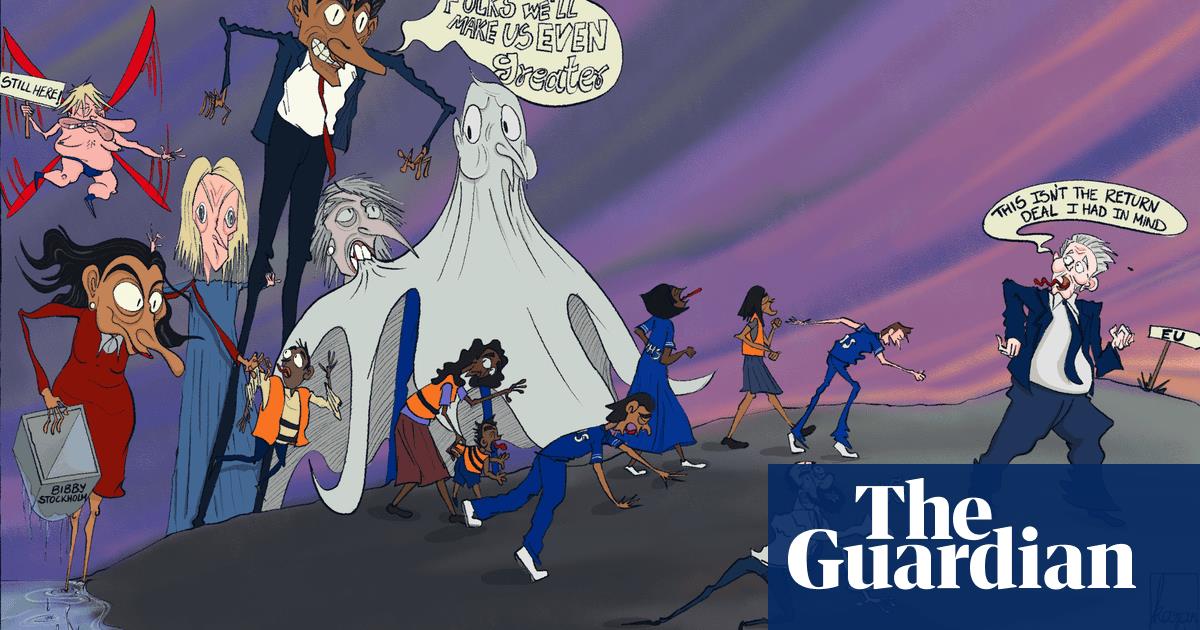
The shadow cabinet is split over whether to back a Brexit deal, as backbench Labour MPs warn that up to 60 could rebel if Keir Starmer insists they back the government rather than allowing a free vote.
Two backbench MPs said the potential for a frontbench reshuffle – and new shadow ministerial posts – had been raised when the issue had come up in conversations with Starmer’s office, as a way of containing potential rebels.
Those in the shadow cabinet who have made vocal arguments in favour of abstaining at the vote including the shadow chief secretary to the Treasury, Bridget Phillipson, the shadow equalities secretary, Marsha de Cordova, and the shadow international trade secretary, Emily Thornberry, according to multiple sources. The shadow justice secretary, David Lammy, is torn, one source said, “between his heart and his head”.
Those who have underlined the need to vote in favour of a deal are said to include Angela Rayner, the deputy leader, and Lisa Nandy, the shadow foreign secretary.
One shadow cabinet source said the shadow chancellor, Anneliese Dodds, a former MEP who represents the heavily remain seat of Oxford East, was also in favour of abstaining. But an ally of Dodds insisted she had not yet made a decision, and would judge any deal on its merits – and compare it with the promises made by ministers.
“If there is a deal, she will want to go through it with a fine-tooth comb – that’s the way she operates. She will make a decision based on the evidence in front of her,” the source said.
At a speech at Bloomberg on Wednesday, Dodds made clear Labour was sceptical about any Brexit deal. “It is not a foregone conclusion that we will emerge with a deal … If we do obtain a deal, media reports suggest it will be as thin as gruel,” she said.
Shadow cabinet sources said there were unlikely to be top table resignations. “There have been healthy discussions about how we proceed from here. Ultimately, no one disagrees that the divide between leave and remain is over – but we’ve got to show we are serious about moving forward as a party and as a nation,” a source said.
Another shadow cabinet source said there was “just a difference of opinion on what is best, both now and trying to predict the future”.
Most of those involved in the disagreement have long-held views on the subject – the only person who has made an obvious conversion is the Labour leader himself, it was claimed.
However, there is more widespread anger among backbench MPs, dozens of whom may be prepared to break the whip if Starmer orders them to back the deal, the Guardian has been told. MPs confronted their party’s leader about the issue at a private meeting on Wednesday and some now believe the leadership may be more open to the idea of abstaining or allowing a free vote.
Those likely to resist voting for a deal are likely to span ideological divides in the party, from new leftwing MPs unwilling to back a Boris Johnson deal to metropolitan MPs, veterans of the People’s Vote campaign.
Labour insiders say Starmer’s team has been taken aback at the scale of the concern inside the party, especially the hostile reaction to a rumour that the former Darlington MP Jenny Chapman, now a senior member of Starmer’s staff, was co-ordinating a letter from Labour MPs saying the party should back a deal.
The crunch point is likely to be next Tuesday’s shadow cabinet meeting, a day after the governing national executive committee meets to finalise the party’s response to the equality watchdog report into antisemitism.
The leftwing pro-Europe pressure group Another Europe is Possible is mobilising a campaign of grassroots pressure to oppose the vote, with a few thousand letters to MPs and the leadership from members.It comes as a report by the Tory thinktank Onward paints a difficult choice for Labour on the issue. It found that the party had the potential to recapture former Labour voters in northern England, as one in five Conservative voters, mostly concentrated in these seats, “lent their votes” at the last election, doubling the party’s majority from 42 to 80.
However, it found the Conservative coalition of shire seats and northern towns was “highly homogeneous in terms of values” especially social-cultural issues, and that Labour was struggling to bridge the divide between its traditional and metropolitan seats.
Will Tanner, the director of Onward, said: “Unless Keir Starmer radically changes Labour’s younger, metropolitan coalition, he will have to do the political splits to unite his party and be unable to reach other voters with a fundamentally different set of values.”












